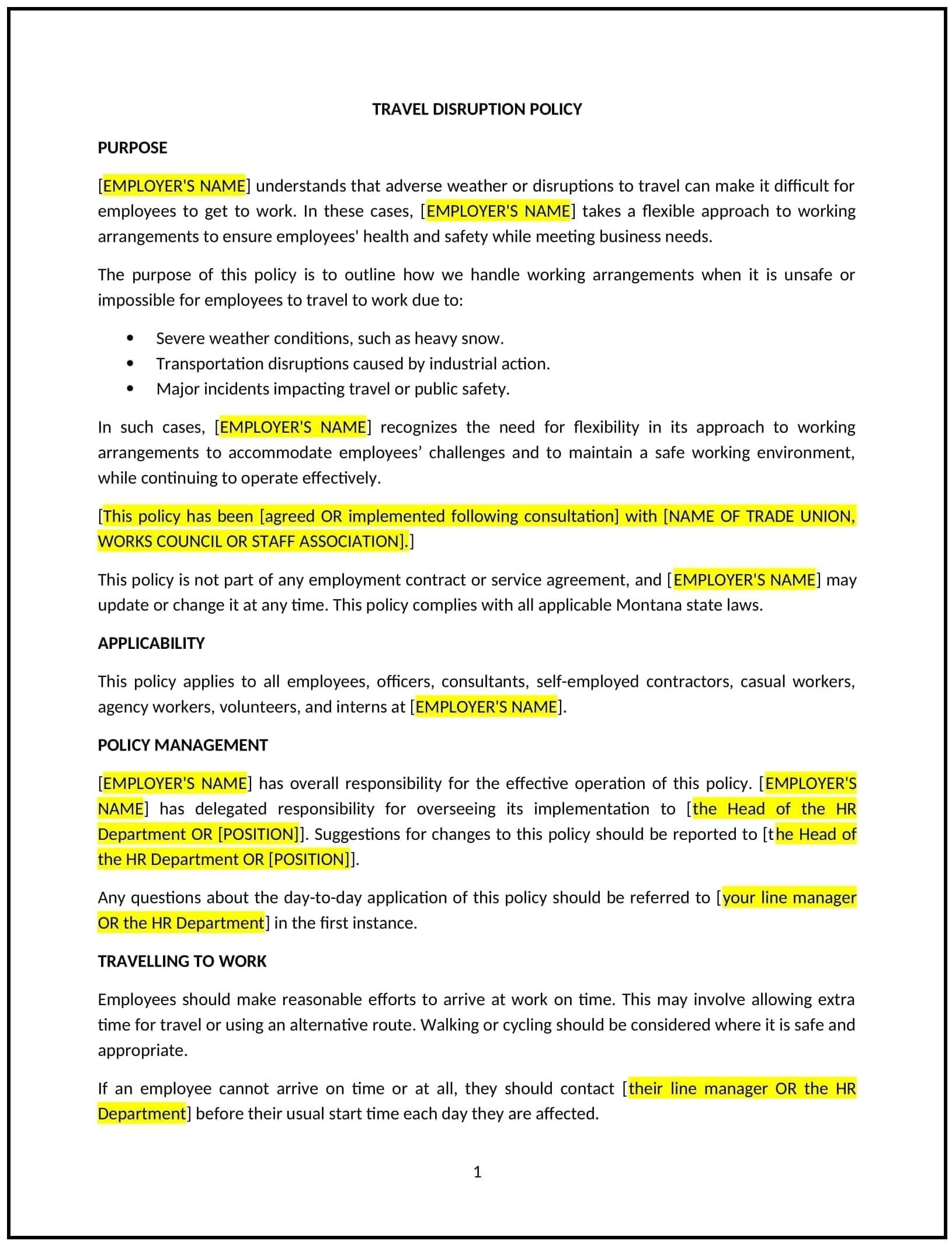Got contracts to review? While you're here for policies, let Cobrief make contract review effortless—start your free review now.

Customize this template for free
Travel disruption policy (Montana)
A travel disruption policy helps Montana businesses manage situations where employee travel plans are affected by unforeseen disruptions such as weather conditions, transportation strikes, flight delays, or other emergency events. This policy outlines the steps employees should take when faced with travel disruptions, the company’s responsibility for supporting employees during these events, and the procedures for managing any additional costs incurred due to disruptions.
By implementing this policy, businesses can support employees during travel disruptions, reduce the impact on business operations, and ensure that employees are not financially burdened by travel-related challenges outside their control.
How to use this travel disruption policy (Montana)
- Define travel disruptions: The policy should specify what qualifies as a travel disruption, including events such as weather delays, flight cancellations, transportation strikes, natural disasters, or other emergencies that affect employees’ ability to travel as planned.
- Establish employee responsibilities: The policy should outline the actions employees should take in the event of a travel disruption, including notifying their manager, seeking alternative travel arrangements, and keeping the company updated on their status.
- Clarify company support: The policy should define the company’s role in assisting employees during disruptions, such as providing support for rebooking flights, covering additional travel costs, or arranging temporary accommodations if necessary.
- Address additional costs: The policy should clarify whether the company will reimburse employees for additional costs incurred due to the disruption, such as extra transportation fees, hotel stays, or meals, and outline the process for submitting reimbursement claims.
- Set expectations for business continuity: The policy should specify how employees should manage work responsibilities during disruptions, including maintaining communication with their team and continuing work remotely if necessary, ensuring minimal disruption to business operations.
- Review and update regularly: The policy should be reviewed periodically to ensure it is aligned with the business's needs, employee expectations, and any changes in travel regulations or business practices.
Benefits of using this travel disruption policy (Montana)
This policy provides several key benefits for Montana businesses:
- Supports employees during disruptions: By offering clear guidelines and support, the policy helps employees manage unexpected travel issues without facing undue stress or financial burden.
- Maintains business continuity: The policy ensures that employees are able to continue work as much as possible during disruptions, whether through remote work or alternative arrangements, minimizing disruptions to business operations.
- Reduces confusion and uncertainty: A well-defined policy provides employees with a clear understanding of the steps they should take in the event of a travel disruption, reducing confusion and potential conflicts.
- Protects the company’s reputation: By offering support during travel disruptions, the company demonstrates a commitment to employee well-being, which can enhance its reputation as a responsible and employee-friendly organization.
- Increases employee satisfaction: Offering assistance during travel disruptions contributes to employee satisfaction by showing that the company values its employees and is willing to help in times of need.
- Mitigates financial risks: The policy outlines how the company will manage the costs of disruptions, reducing the risk of financial strain on both employees and the business.
Tips for using this travel disruption policy (Montana)
- Communicate the policy clearly: Ensure that all employees are aware of the policy and understand the steps to take in the event of a travel disruption. This can include providing training or including the policy in the employee handbook.
- Monitor travel disruptions: Keep track of potential disruptions, such as weather patterns or transportation strikes, that may affect employee travel plans and offer proactive solutions where possible.
- Offer support promptly: Ensure that employees have access to the resources they need to manage disruptions, such as travel booking assistance, accommodation options, or financial support for additional costs.
- Be flexible with remote work: If disruptions prevent employees from traveling to the office, allow for flexible work arrangements, such as remote work, to ensure that business operations continue without interruption.
- Keep documentation for reimbursement claims: Maintain a clear and efficient process for employees to submit documentation for reimbursement, ensuring that claims are processed quickly and accurately.
- Review the policy regularly: Periodically review the policy to ensure it remains up-to-date with changes in travel conditions, company practices, and employee needs.